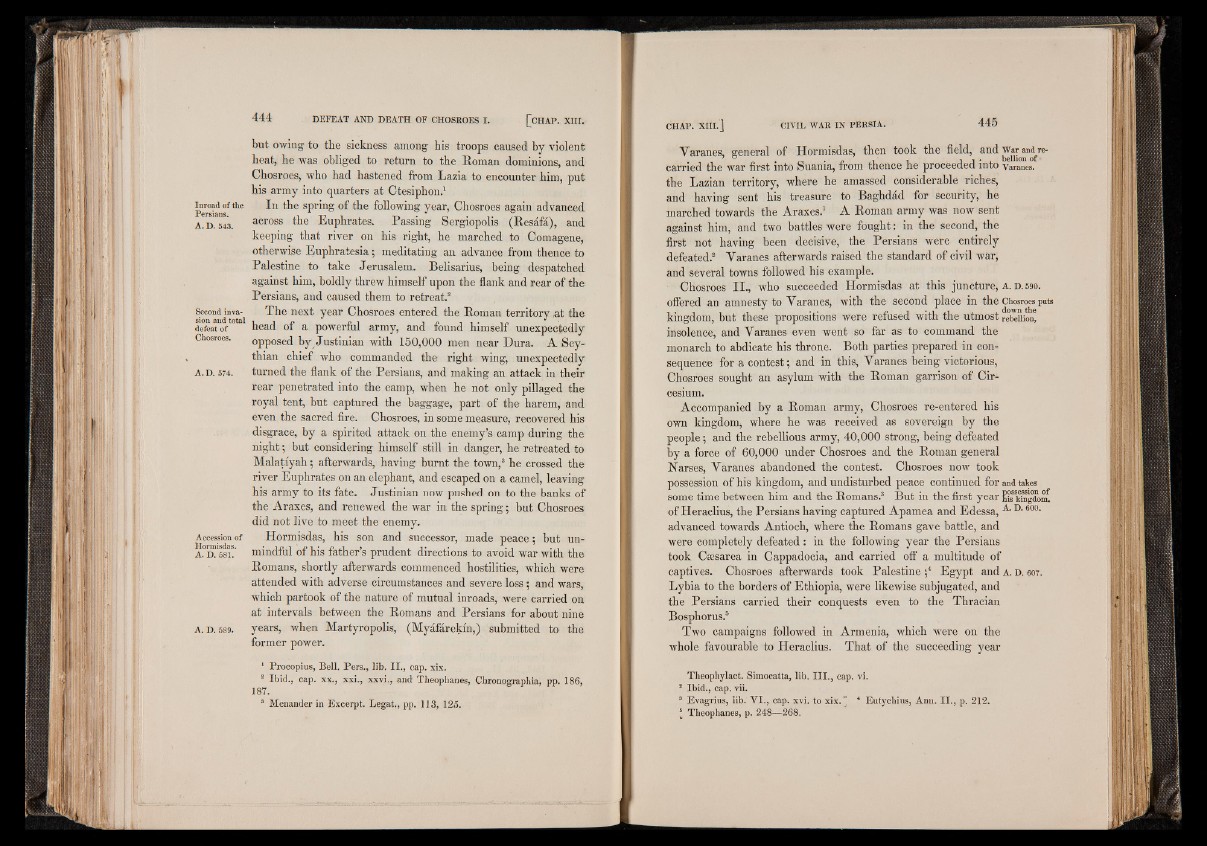
Inroad of the
Persians.
A. D. 543.
Second invasion
and total
defeat of
Chosroes.
A.D . 574.
Accession of
Hormisdas.
A. D. 581.
A. D. 589.
but owing to the sickness among his troops caused by violent
heat, he was obliged to return to the Roman dominions, and
Chosroes, who had hastened from Lazia to encounter him, put
his army into quarters at Ctesiphon.1
' In the spring of the following year, Chosroes again advanced
across the Euphrates. Passing Sergiopolis (Resafa), and
keeping that river on his right, he marched to Comagene,
otherwise Euphratesia; meditating an advance from thence to
Palestine to take Jerusalem. Belisarius, being despatched
against him, boldly threw himself upon the flank and rear of the
Persians, and caused them to retreat.2
The next year Chosroes entered the Roman territory ,at the
head of a powerful army, and found himself unexpectedly
opposed by Justinian with 150,000 men near Dura. A Scythian
chief who commanded the right wing, unexpectedly
turned the flank of the Persians, and making an attack in their
rear penetrated into the camp, when he not only pillaged the
royal tent, but captured the baggage, part of the harem, and
even the sacred fire. Chosroes, in some measure, recovered his
disgrace, by a spirited attack on the enemy’s camp during the
night; but considering himself still in danger, he retreated to
Malatiyah; afterwards, having burnt the town,3 he crossed the
river Euphrates on an elephant, and escaped on a camel, leaving
his army to its fate. Justinian now pushed on to the banks of
the Araxes, and renewed the war in the spring; but Chosroes
did not live to meet the enemy.
Hormisdas, his son and successor, made peace; but unmindful
of his father’s prudent directions to avoid war with the
Romans, shortly afterwards commenced hostilities, which were
attended with adverse circumstances and severe loss; and wars,
which partook of the nature of mutual inroads, were carried on
at intervals between the Romans and Persians for about nine
years, when Martyropolis, (Myafarekin,) submitted to the
former power.
1 Procopius, Bell. Pers., lib. I I ., cap. xix.
2 Ibid., cap. xx., xxi., xxvi., and Theophanes, Chronographia, pp. 186,
187.
3 Menander in Excerpt. Legat., pp. 113, 125.
Varanes, general of Hormisdas, then took the field, and War and^re-
carried the war first into Suania, from thence he proceeded into varanes.
the Lazian territory, where he amassed considerable riches,
and having sent his treasure to Baghdad for security, he
marched towards the Araxes.1 A Roman army was now sent
against him, and two battles were fought: in the second, the
first not having been decisive, the Persians were entirely
defeated.2 Yaranes afterwards raised the standard of civil war,
and several towns followed his example.
Chosroes II., who succeeded Hormisdas at this juncture, a . d . 590.
offered an amnesty to Varanes, with the second place in the Chosroes puts
kingdom, but these propositions were refused with the utmost rebellion,
insolence, and Yaranes even went so far as to command the
monarch to abdicate his throne. Both parties prepared in consequence
for a contest; and in this, Yaranes being victorious,
Chosroes sought an asylum with the Roman garrison of Cir-
cesium.
Accompanied by a Roman army, Chosroes re-entered his
own kingdom, where he was received as sovereign by the
people; and the rebellious army, 40,000 strong, being defeated
by a force of 60,000 under Chosroes and the Roman general
Narses, Varanes abandoned the contest. Chosroes now took
possession of his kingdom, and undisturbed peace continued for and takes
some time between him and the Romans.3 But in the first year his kingdom,
of Heraclius, the Persians having captured Apamea and Edessa, D> 60°-
advanced towards Antioch, where the Romans gave battle, and
were completely defeated : in the following year the Persians
took Caesarea in Cappadocia, and carried off a multitude of
captives. Chosroes afterwards took Palestine ;4 Egypt and a . d . 607.
Lybia to the borders of Ethiopia, were likewise subjugated, and
the Persians carried their conquests even to the Thracian
Bosphorus.5
Two campaigns followed in Armenia, which were on the
whole favourable to Heraclius. That of the succeeding year
Theophylact. Sixnocatta, lib. I l l , , cap. vi.
2 Ibid., cap. vii.
3 Evagrius, lib. V I., cap. xvi. to x ix .] 4 Eutychius, Ann. I I ., p. 212.
3 Theophanes, p. 248—268.